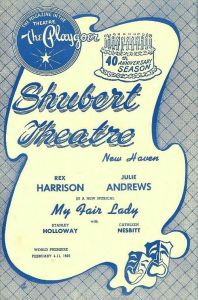New Haven’s iconic Shubert Theatre, which earned the nickname “Birthplace of the Nation’s Greatest Hits” after decades of distinctive dramatic debuts, first opened its doors in December 1914. It was the second theater built by the Shubert Organization, a family-run theater management business, and was patterned after the original Shubert Theatre in New York City, featuring ornate, gilded details throughout the theater interior. Two years after its grand opening, the Shubert hosted the premiere of Robinson Crusoe, Jr., starring Al Jolson, who was then considered one of the world’s foremost entertainers, and over the ensuing years would continue to function as an “off-Broadway” incubator where some of the world’s most beloved musicals and dramas would be staged for the first time.

In the early to mid-20th century, the Shubert’s New Haven audience was considered to be reliably cultured and well-educated, and playwrights like Neil Simon, Tennessee Williams, and Eugene O’Neill were eager to see how their works were received there before tweaking them and bringing them to larger audiences in New York. The famous musical-writing duo Rodgers and Hammerstein were especially fond of the Shubert, and debuted several of their most well-known musicals there, including South Pacific, The King and I, The Sound of Music, Carousel, and Away We Go (which changed its name to Oklahoma! before making the move to Broadway). Throughout its first sixty years of existence, the Shubert hosted an endless stream of some of 20th century America’s most famous celebrities, from Spencer Tracy, Humphrey Bogart, Jimmy Stewart, Clark Gable and Katharine Hepburn from the black-and-white film era, to Sidney Poitier, Julie Andrews, Robert Redford, Carol Burnett, James Earl Jones, future First Lady Nancy Reagan, and countless other stars.
Faced with increasing competition from movie theaters, skyrocketing costs of theater productions, and economic stagflation, the Shubert Theatre struggled to stay open in the early 1970s and closed its doors in 1976. Right around the same time, New Haven city planners were pursuing an aggressive agenda of “urban renewal” that threatened to demolish older, unfashionable buildings like the Shubert. Through the concerted efforts of a number of New Haven residents and community arts groups, the theater was saved from destruction, and slowly and painstakingly restored over the next several years. Seven years after it was nearly destroyed, the Shubert staged its own dramatic comeback story, reopening on December 13, 1983. Today, it remains New Haven’s premiere theater venue, hosting dozens of touring Broadway productions, musicals concerts, and other productions even year.
Further Reading
“Our History: Overview,” Shubert Theatre website
Scott Hamilton, “At This Theatre: Shubert Theatre, New Haven, CT,” Playbill

